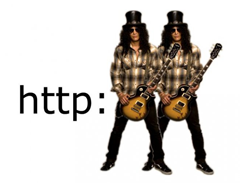by dotnetnerd
20. May 2011 13:35
In my last post I looked at how WCF Web API plays well with JQuery Templates. A former colleague of mine questioned if it could be used in all scenarios. This is a rather broad question, but I do think it can be used for most of your templating needs. So in this post I will give an example of what can be done just with templates – and then I will take a look at KnockoutJS to make my templating scenario even sweeter.
More...
by DotNetNerd
1. May 2011 21:38
Since my last blogpost about Web API Glenn Block appeared on Hanselminutes so it seems to be hot stuff at the moment. Having already written part of this blogpost, as it was actually part of the last post before I decided to break it in half, it seems a good time to finish it and get it out there. So building on my last post I will also take a look at how Web API plays along with JQuery and the new JQuery templates.
More...
by dotnetnerd
25. April 2011 14:14
Over the last couple of weeks I have been looking a bit at the WCF Web API which I think is looking very promising. Web API is one of Microsofts newer open source projects, aiming at providing http based services on top of WCF - while providing an easy to use API that give developers full control. In a way this makes me think of MVC, which has given control of the markup back to the developers, just like Web API is trying to do for http. Already loving what MVC has done for me, this makes me very positivt about the approach right off the bat.
RESTful services seem to be all the rage these days, which made me look at some of the choices we have as developers for doing REST. This was really my first look at Web API, so with it being one of the more exciting news at MIX11, it was only natural to take a deeper look.

More...
by DotNetNerd
1. April 2011 19:57
A piece of advise that is often given to developers who want to keep improving, is to learn a new programming language every year. I mostly think it holds true if you try to learn a new paradigme – because just learning new syntax won’t really get you anywhere.
Koans
One way of learning a new language is of course to buy a book or two, and start reading and doing some samples and small applications. Another way of going about it is to try some of the koans, interactive interpreters and introductory guides that can be found online.

More...
by dotnetnerd
9. March 2011 18:37
One might think that the title of this blogpost is due to the fact that this summer I will be turning 30.
However it is actually a task I have been looking into, that could also be phrased as: I wish to build a REST based service, what are my options? With REST gaining in popularity I think this a question that a number of developers are asking themselves these days.
First of all what is REST? REST is about staying true to the HTTP protocol, and using it to communicate between a client and a server - as opposed to SOAP. To parafrase from Wikipedia being RESTful is about using URIs, HTTP verbs and mediatypes as the means to communicate using a traditional request/response model.

More...
by DotNetNerd
3. March 2011 16:28
For some time I have heard good things about git and mercurial, but just never got around to really looking at it. So when I had last week off I finally got around to doing more than just cloning a repository from github or bitbucket. Basically what I needed was some easy way of doing source control for my pet projects, so either would no doubt get the job done.
My focus ended up being mostly on git simply simply because I often run into github when I read about open source projects that I find interesting. Another thing I had in the back of my head was that I could take a look at appharbor - which I hear about a lot on twitter. That being said I did read the Hg Init tutorial, just to get a feel of the differences between the two. As it turnes out they are very similar, so it will probably be the integration with github, bitbucket, heroku and so on that will decide for me in each case.
More...
by dotnetnerd
9. February 2011 13:36
Lately I have heard quite a few people mention the Sinatra framework, which is a very light-weight webframework for Ruby. Already being fond of Ruby I decided to take a look at Sinatra, so I could see what all the fuss was about.
Right off the bat I decided to install Ruby instead of going with IronRuby like I had done so far. Sadly I am not feeling too secure about the future of IronRuby, since Microsoft stopped investing in it - but of course I really hope that it will continue to go foreward as open source. Because of this insecurity and because of basic curiosity I decided to to “pure Ruby”. After all getting started is just running the installer you can download from ruby-lang.

More...
by DotNetNerd
12. January 2011 16:01
Lately I have had the chance to work with Silverlight, which suits me just fine since I am looking to get my hands on a HTC Mozart, and start building some apps. I was already in the process of reading Silverlight 4 in Action, so it all seems to come together at the moment.
Diving in I have been looking at bindings, which in turn made me look at the MVVM pattern and in the end Caliburn Micro. Anyway, I am getting ahead of myself, because what I want to write about today is how bindings work in Silverlight.

More...
by DotNetNerd
30. December 2010 17:41
The last thing I will compare in this round of Battle of the ORM’s is how NHibernate and the Entity Framework handle persistence. So first of all I want to vent one of my pet peeves, which is the myth of persistence ignorence.
Persistence ignorence is a term used to describe a persistence mecanism that does not contaminate the domain model and hence the business logic. This means that the model can be ignorent of how it is stored and not contain detals about the datastore. I think this a very important design goal to strive for, however actually obtaining true ignorence is a myth and something no ORM is even close to achieving.
More...
by DotNetNerd
14. December 2010 17:59
This week I went with two colleagues to get certified in using the PreCom framework, which is developed by Pocket Mobile. So we spent two days at Vertica office in Ballerup, learning about the API and how to install and configure a PDA to run PreCom.
What is PreCom?
The PreCom framework consists of 5 building blocks on top of the Compact Framework. In decending order of importance they are: communication, storage, updates , logging and hardware.

More...